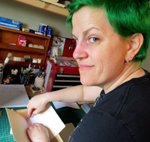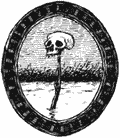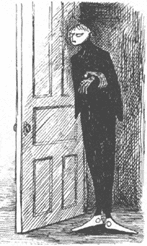While watching Adam Baker’s TED talk, I was really struck when he talked about accumulating experiences instead of accumulating stuff by going into debt.
I’ve been talking a lot with Nate about our approaches to stuff lately. I place a very, very high value on stuff. This is why about 75% of the things in our apartment are mine. Literally, almost all his stuff is in his one room, and the entire rest of our 1100 sqft apartment is furnished and filled almost entirely with my things. We use some of his kitchen stuff, that’s about it.
A big part of this, of course, is my enormous library (1,300 books and counting!) and the shelves that house it, but mostly I just have a lot of things. Some are expensive (an Alienware laptop), some aren’t (a collection of glow-in-the-dark skulls from cereal boxes).
Baker’s emphasis on experiences doesn’t work for me. My memory isn’t great. I was gaslighted as a child, which taught me not to trust my own memories — and a memory that’s not trusted isn’t going to be reliable. Fibromyalgia brought with it a semi-continuous brain fog, whose effects on my long-term memory is probably best explained through this analogy:
Imagine your memory is a bunch of filing cabinets. You can file memories by date, or by subject, or have ticklers in one set of files that go to another, so that when you look up “June 5, 2007” or “my birthday last year” there’s a list of other files to check for what happened. Kind of like an old-school library catalog.
Fibromyalgia means that my cross-references are written in fading ink, and that many of my subjects have barely-legible tabs and are in the wrong place in their drawer. Often a memory will point to the next one chronologically, so if I want to remember what I had for breakfast (or whether I even ate breakfast), I may have to go back to my first memory of the day and walk forward or backward.
The individual memories are good, it’s the filing system that’s bad.
Objects, for me, are generally reliable reminders of sensory memories. I may not be able to place when I remember something from, but I’ll be able to remember the sensation — the experience. That’s why I collect autographs, for example. Holding the autograph makes me remember the encounter, often with surprising accuracy. Some items’ associated memories are more about what I’m planning to do with them than what I’ve done with them (I have lots of broken things I’ve been meaning to fix, craft supplies, abandoned projects, etc), but I recognize that as a hangup and am working on getting over it and handing things like unused craft supplies and other projects on to folks who’ll actually do ’em.
Some folks say we are the sum of our memories, and by that measure, if I have none of my things, I don’t entirely exist.
Now, some items are less important than others, and some have less than pleasant memories attached to them, and those can go. But the thought of getting rid of everything until all my belongings can fit in a backpack is horrifying. Every time I lose or damage something that is attached to an important memory, it’s incredibly upsetting.
There’s also an element of childish fear, of course — one of the things I was praised for as a child was the care I took of my toys (I ripped half a buckle off my Swiss Miss doll’s shoe when I was tiny, and lost Chief Warrick’s staff from my Star Wars action figure collection, and that’s about it). Add in my impostor complex and you’ve got a recipe for disaster any time I fail to take spectacular care of my things. But the primary issue that comes up whenever I think about getting rid of my stuff is that without it, I won’t be able to remember things as well.
Getting rid of all my stuff would essentially get rid of most of my memories of my past, good as well as bad, and without my memories, who am I?




9 Responses to Stuff: Good or Bad?